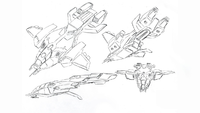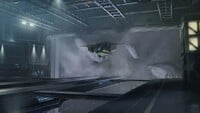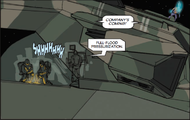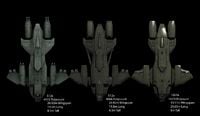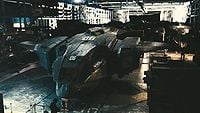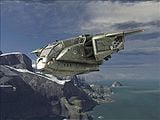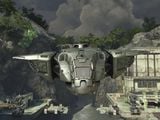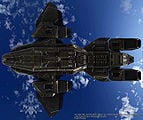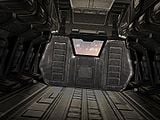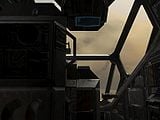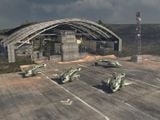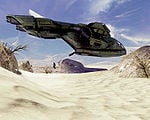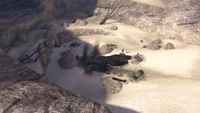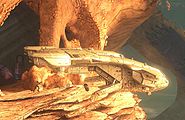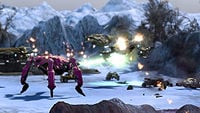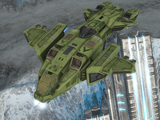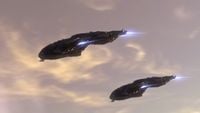D77H-TCI Pelican: Difference between revisions
From Halopedia, the Halo wiki
Tag: Reverted |
BaconShelf (talk | contribs) m (Undo revision 1627482 by 68.104.195.33 (talk) Echo 419 is a D77-TC Pelican, not a D77H-TCI) Tag: Undo |
||
| Line 55: | Line 55: | ||
==Identified Pelicans== | ==Identified Pelicans== | ||
*''[[Echo 051]]'' | *''[[Echo 051]]'' | ||
*''[[Kilo 023]]'' | *''[[Kilo 023]]'' | ||
*''[[Oscar 5]]'' | *''[[Oscar 5]]'' | ||
Revision as of 10:57, May 14, 2024
| Dropship 77 - Heavy - Troop Carrier/Infantry | |
|---|---|
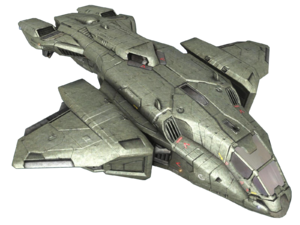
| |
| Production information | |
|
Manufacturer: |
|
|
Class: |
|
|
Role: |
|
| Technical specifications | |
|
Length: |
30.5 meters (100 ft)[3] |
|
Width: |
23.4 meters (77 ft)[3] |
|
Engine(s): |
|
|
Armament: |
|
|
Complement: |
|
|
Crew: |
|
| Chronological and affiliation | |
|
Era: |
|
|
Affiliation: |
|
The D77H-TCI Pelican[2][7] (Formal classification: Dropship 77 - Heavy - Troop Carrier/Infantry),[7] more commonly known as the Pelican, is a model of the traditional D77-TC Pelican dropship.[7]
Design
Layout/Hull
As a dominant Pelican model for many decades, the D77H-TCI Pelican features a versatile airframe, a power-efficient thruster configuration, and dense ablative armor for quick-transfer deployments deep into foe-occupied area.[7] Like the previous standard D77 model used during the Human-Covenant War, it features an extraordinary level of versality with regard to its arsenal, albeit parts with its forbearer in a variety of ways with several interior and exterior design differences.[7] This includes most notably vertically staggered cockpit seats in tandem, with the co-pilot seated behind and above the pilot, instead of both crew sitting next to each other, and the controls and instrument panels are rearranged and upgraded.[7][2] A small holotank is installed in the cockpit, allowing a "smart" AI to project its holographic avatar to the craft's pilots.[8]
Armament
The D77H-TCI Pelican's standard armament has two Anvil-II air-to-surface missile pods—which are integrated seamlessly into the fuselage rather than being externally mounted to the wings—and a rear-bay-mounted machine gun–typically an AIE-486H machine gun–in its troop bay for providing sufficient suppresive fire for supporting ground teams and loading or offloading personnel in contested sites, and covering the departure of its passengers, although this prevents it from carrying a vehicle internally.[7][4] The ANVIL pods can fire up to twelve missiles at once, six from each pod.[4] It may also features a trio of nose-mounted chainguns.[6]
Powerplant/Propulsion
The main engines are mounted in pairs in four nacelles, with one situated on each wing and two at the rear and posterior.[4] The nacelles can articulate independently, thus altering the direction of thrust, referred to as vectoring in aviation; this improves the Pelican's low altitude maneuverability.[4] Eight ventral thrusters are identified by markings and a rendered thrust effect, one on each wing nacelle and one on each aft nacelle, allow the drop ship to land and take off vertically.[4] These engines are capable of both space and atmospheric operation.[4] It has eight jet intakes, three on each side and two on top, though intakes are obviously not able to function in a vaccuum.[4]
Crew and complement/Payload capacity
There are also differences in the bay of the craft: the so-called "blood tray".[12] Although the D77H-TCI Pelican carries the same number of passengers as its predecessor, its troop-bay is more flexible, able to carry up to two M274 Mongoose internally, in addition to ten passengers.[4] Like the original models, the D77H-TCI's tail-mounted magnetic clamps are capable of carrying an M12 Warthog, an M808 Scorpion, or several resupply canisters.[4]
Variants
A gunship version of the D77H is in service; this heavily armed version is equipped with more chainguns, missiles, and a large cannon mounted at the ventral-fore of the dropship.[13] Another configuration of the D77H Pelican were used by the UNSC Spirit of Fire crew during the Harvest campaign and Battle of the Etran Harborage.[14][15]
- D77C-NMPD Pelican – A variant of the D77H-TCI and the D77C Pelican itself with very few modifications made to the later over the former, and was utilized by the New Mombasa Police Department in Kenya, Africa, on Earth.[16]
Identified Pelicans
Service history
Human-Covenant War
The D77H-TCI Pelican was introduced at least during the Insurrection and numerous, along with the original D77-TC Pelican, were as well deployed during the battles of the Human-Covenant War.[9] During the Battle of Chi Ceti, the SPARTAN-II company used a D77H-TCI Pelican to make a boarding action against the Covenant Zanar-pattern light cruiser Unrelenting by flying out of the Pelican with thruster packs to board the nearby enemy vessel.[17][18][Note 1]
Multiple D77H-TCI Pelicans were in use over course of Harvest campaign and later Battle for Arcadia and Battle of Trove,[15] including one such Pelican with a woodland camouflage scheme that was used by the Sergeant John Forge and the Fire Team Lima to board the heavily damaged UNSC Prophecy to purge its NAV database and recover the survivors of the Marathon-class heavy cruiser.[14]
In the final year of the Great War, the D77H-TCI Pelicans may have been used during the Battle of Sigma Octanus IV and the Fall of Reach.[18][19][Note 2] An extensive number of D77H-TCI Pelicans was prominently deployed during the Battle for Earth,[4] including during the final space battle against Prophet of Truth's loyalist armada led by Anodyne Spirit.[20] They were again deployed extensively by the Battle Group Victory supported by the Sangheili separatist Fleet of Retribution during the Battle of Installation 00, the final battle of the war.[4]
Post-war

|
Browse more images in this article's gallery page. |
In the aftermath of the Human-Covenant War, many D77H-TCI Pelicans remains in service even when they were supplanted by the D79-TC Pelican. Numerous D77H-TCI Pelicans were used against a splintered Covenant group during the Battle of Draetheus V in 2554.[10] A number of D77H-TCI Pelicans were assigned to the UNSC Infinity, the flagship of UNSC Navy, and were deployed by the supercarrier notably during the Operation: WHISTLE STOP and WOLFE.[21][11]
Gallery
Concept art
D77H-TCI concept art for Halo Legends: Homecoming.
Concept art of a D77H-TCI in Halo 2: Anniversary's terminals.
Artwork
A Pelican with a woodland camouflage scheme encoutering a Ru'swum-pattern Phantom in Halo Wars: Genesis.
Renders
A comparison of the D77H-TCI and the D77-TC models from Halo: Combat Evolved and Halo 2.
Several D77H-TCI along with C712 Longswords during the Operation: WHISTLE STOP.
Screenshots
D77H-TCI dropship outside The Pit.
A D77H-TCI dropping off two ODSTs on Installation 00.
A D77H-TCI crashed on High Charity.
A squadron of Hornets and Sparrowhawks protect a number of Pelican dropships from a Protos Scarab in an early build of Halo Wars.
Three Pelicans during the Harvest campaign in Halo Wars.
A massive fleet of multiple D77Hs and AV-14 Hornets bombards an insurrectionist position in Origins.
A pair of Pelicans, possibly D77H-TCIs, over Eridanus II in Scanned.
List of appearances
|
Notes
- ^ a b Though the D77H-TCI Pelican was used for external design of the Pelican carrying the Spartan-IIs, its internal design, however, seem to be indentical to that of a D79-TC Pelican.
- ^ The internal design from the standard D77-TC Pelican was used for all Pelicans in all Halo: Fall of Reach comics although their external designs in those comics was based on those from Halo 3.
Sources
- ^ Halo: Landfall - Arms Race
- ^ a b c d Halo Waypoint, Pelican (Retrieved on Apr 21, 2021) [archive]
- ^ a b c Halo Encyclopedia (2009 edition), page 252
- ^ a b c d e f g h i j k l m n o p q r s Halo 3: Gameplay and in-game 3D model data
- ^ Halo 4: Scanned
- ^ a b Halo Legends - Homecoming
- ^ a b c d e f g h i Halo Encyclopedia (2022 edition), page 149
- ^ a b Halo 3, campaign level Cortana
- ^ a b Halo Legends - Origins
- ^ a b Halo: Spartan Assault
- ^ a b Halo: Shadows of Reach
- ^ Halo: Ghosts of Onyx, page 203
- ^ Halo 3, multiplayer map High Ground
- ^ a b Halo Wars: Genesis
- ^ a b Halo Wars: Campaign gameplay
- ^ Halo Waypoint, NMPD Pelican: (defunct, archive here) (Retrieved on Mar 26, 2011) [archive]
- ^ Halo: The Fall of Reach - The Animated Series
- ^ a b Halo: Fall of Reach: Covenant
- ^ Halo: Fall of Reach: Invasion
- ^ Halo: Uprising, issue 4
- ^ Halo: Escalation, issue 12
| |||||||||||||||||
| ||||||||||||||||||||||||||||||||||||||||||||||||||||||||

